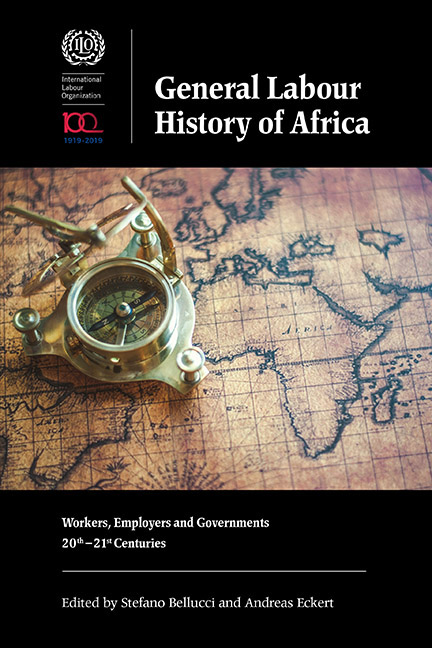Book contents
- Frontmatter
- Contents
- List of Maps and Figures
- List of Tables
- Notes on Contributors
- Foreword
- Acknowledgements
- The ‘Labour Question’ in Africanist Historiography
- Part I Free and Unfree Labour
- 1 Wage Labour
- 2 Precarious and Informal Labour
- 3 Forced Labour
- Part II Key Sectors
- Part III International Dimensions and Mobility
- Part IV Varieties of Work
- Part V Entrepreneurs and Self-Employment
- Part VI The State, Unions and Welfare
- Part VII Conclusions
- Select Bibliography
- Index
3 - Forced Labour
from Part I - Free and Unfree Labour
Published online by Cambridge University Press: 21 September 2019
- Frontmatter
- Contents
- List of Maps and Figures
- List of Tables
- Notes on Contributors
- Foreword
- Acknowledgements
- The ‘Labour Question’ in Africanist Historiography
- Part I Free and Unfree Labour
- 1 Wage Labour
- 2 Precarious and Informal Labour
- 3 Forced Labour
- Part II Key Sectors
- Part III International Dimensions and Mobility
- Part IV Varieties of Work
- Part V Entrepreneurs and Self-Employment
- Part VI The State, Unions and Welfare
- Part VII Conclusions
- Select Bibliography
- Index
Summary
In its 1930 Convention on Forced Labour, the International Labour Organization defined ‘forced or compulsory labour’ as ‘all work or service which is exacted from any person under the menace of any penalty and for which the said person has not offered himself voluntarily’. Representatives at the Geneva Convention further clarified forced labour as a particular ‘practice of compulsory labour exacted by a state or by agencies of a state, other than as a punishment for a criminal offence or for the purpose of the military defence’. Colonial powers faced enormous pressure to sign up to the 1930 ILO Convention, and several states delayed ratifying it. Despite this general agreement on the abolition of forced labour, despite increased pressure from non-governmental humanitarian groups and despite efforts by colonial reformers – including Jules Marcel de Coppet, the Governor General of French West Africa (1936–38), and Henrique Galvão, inspector of the Portuguese colonies and former governor of Huila Province in southern Angola – forced labour in colonial Africa persisted in many regions through the period of decolonization and into the present. Forced labour in twentieth-century Africa was a widespread means of building and maintaining infrastructure, supporting the mining sector and developing and servicing the export-oriented agricultural sector in French, German, Belgian, Portuguese, Italian and Spanish colonies, and, to a lesser degree, in the British colonies, where public labour ordinances, compulsory labour ordinances and communal labour ordinances served similar goals. Decolonization did not, however, end forced labour. Several postcolonial states have continued this practice, often under thinly disguised forms of military recruitment.
This chapter examines the variety of practices of forced labour during the colonial period on the African continent and its persistence into the postcolonial period. It provides a framework for understanding the context in which Western colonial powers engaged in forced labour and describes the major forms of forced labour used by both the colonial powers and the newly independent African nations. Forced labour was part of a wider set of practices using coerced labour. This chapter focuses on forced labour as a practice of state mobilization of labour in Africa during the twentieth century. As Frederick Cooper reminds us, during ‘the five hundred years in which Europeans and Africans have known each other rather well, no element has been more central in their relationship than work’. Forced labour was a central part of that relationship.
- Type
- Chapter
- Information
- General Labour History of AfricaWorkers, Employers and Governments, 20th-21st Centuries, pp. 77 - 116Publisher: Boydell & BrewerPrint publication year: 2019



